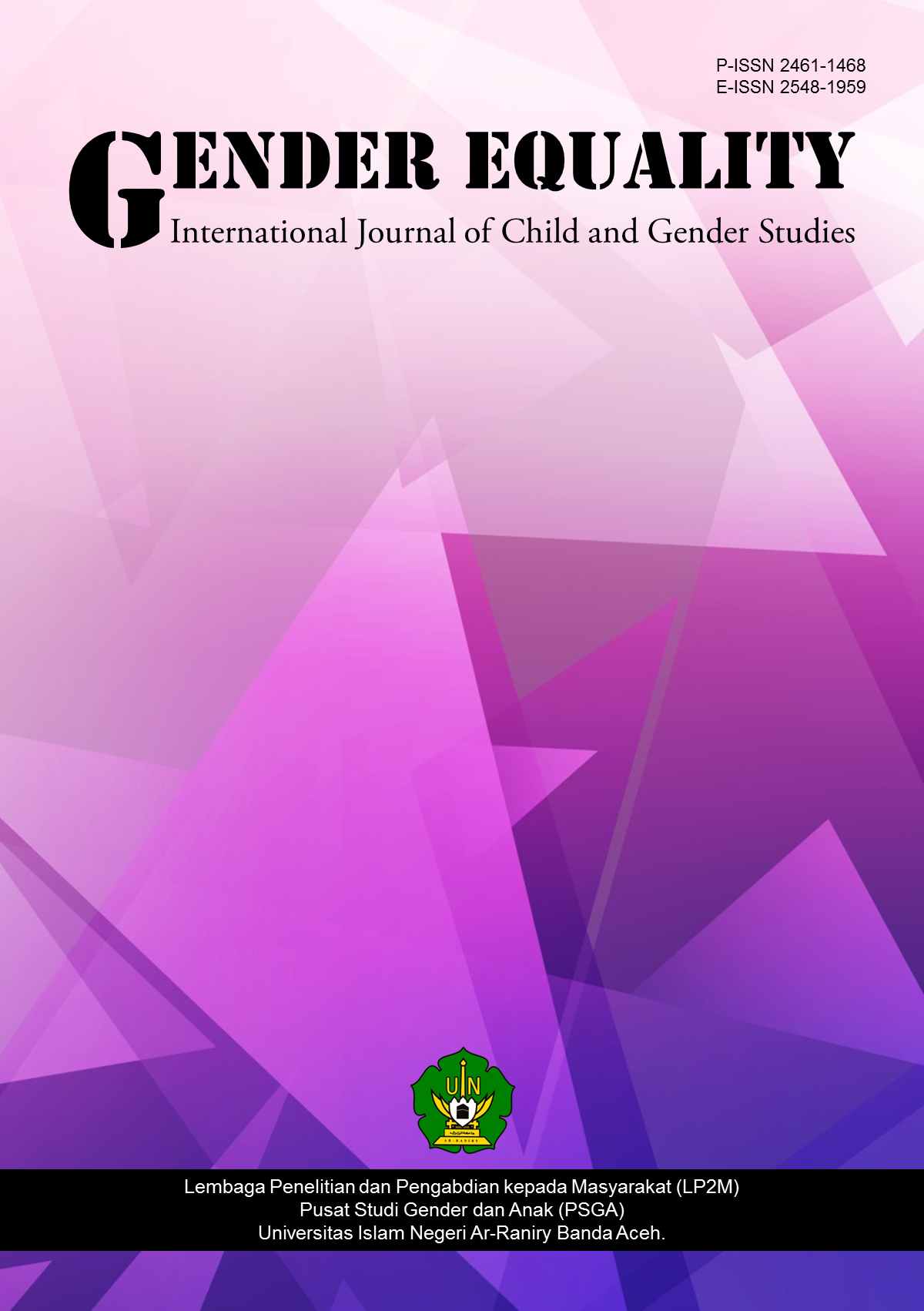EARLY CHILDHOOD CHARACTER EDUCATION PRACTICES BASED ON LOCAL WISDOM IN ACEH: CHALLENGES AND EFFORTS MADE IN GLOBALIZATION ERA
DOI:
https://doi.org/10.22373/equality.v5i2.5598Keywords:
Early Childhood, Character Education, Challenges, Efforts.Abstract
This study was aims to reveal the challenges and efforts in implementing early childhood character education based on local wisdom in Aceh society This study has been conducted using qualitative approach. Its result indicates several challenges faced by Acehnese in implementing character education based on Acehnese local wisdom, including: (a) the impact of technological development; (b) changes in the physical environment such as natural disasters and natural resources; (c) contact with other communities and the culture of the community replaces local culture; (d) modernity promises ease and speed so that the tradition of local wisdom is seen as complicated and slow so that the summarization of tradition is carried out. Therefore, Aceh local wisdom is not only ritual but also contains Islamic values that have become a culture in Aceh.References
Alwasilah, A. Chaedar, D. (2009). Etnopedagogi Landasan Praktek Pendidikan dan Pendidikan Guru. Bandung: Kiblat.
Astuti, S., & Astuti, S. (2017). Agama, Budaya dan Perubahan Sosial Perspektif Pendidikan Islam di Aceh. Jurnal MUDARRISUNA: Media Kajian Pendidikan Agama Islam, 7(1), 23. https://doi.org/10.22373/jm.v7i1.1900
Battistich, V. (2005). Character Education , Prevention , and Positive Youth Development. Character Education, Prevention, and Positive Youth Development, (2000), 1–10.
Benninga, J. S., Berkowitz, M. W., & Kuehn, P. (2003). the Relationship of Character Education Implementation and Academic Achievement in Elementary Schools. Journal of Character Education, 1(1), 19–32.
Damsar. (2015). Pengantar Sosiologi Pendidikan. Jakarta: Kencana.
Daud, D, et al. (2005). Budaya Aceh, Dinamika Sejarah dan Globaalisasi. Banda Aceh: Syiah Kuala University Press.
Fakhriyani, V. . (2017). Pendidikan Karakter Anak Usia Dini sebagai Salah Satu Jawaban dalam Mempersiapkan Generasi Muda untuk Menggapai Bonus Demografi. Jurnal Pemikiran Penelitian Pendidikan Dan Sains, 5(1), 77.
Guang Lea Lee. (2013). Re-emphasizing character education in Early childhood program: korean children’s experiences. Childhood Education, 89(5), 315–322. Retrieved from http://sci-hub.tw/https://doi.org/10.1080/00094056.2013.830907
Lickona, T. (1997). Educating for character: A comprehensive approach. In The construction of children’s character. (pp. 45–62).
Lickona, T. (2013). Pendidikan Karakter: Panduan Lengkap Mendidik Siswi Menajdi Pintar dan Baik. Terjemahan Lita S. Bandung.
Mungmachon, M. R. (2012). Knowledge and Local Wisdom : Community Treasure. International Journal of Humanities and Social Science, 2(13), 174–181.
Murtako, M. (2015). CULTURE-BASED CHARACTER EDUCATION IN MODERNITY ERA. Ta’dib, 20(1), 149. https://doi.org/10.19109/td.v20i1.326
Ratna, dkk. (2013). Pendidikan Keluarga Berbasis Budaya Traditional pada Masyarakat Perkotaan di Medan. Banda Aceh: Balai Pelestarian Nilai Budaya.
Spodek, B., & Saracho, O. N. (2006). Culture and the early childhood curriculum. Early Child Development and Care (Vol. 123). Chicago, USA: Early Child Development and Care. https://doi.org/10.1080/0300443961230101
Sugiyono. (2014). Metode Penelitian Kuantitatif, Kualitatif dan R & D. Bandung: Alfabeta. https://doi.org/10.1017/CBO9781107415324.004
Sularso. (2016a). Revitalisasi Kearifan Lokal dalam Pendidikan Dasar. Jurnal Pendidikn Sekolah Dasar, 2(1), 74.
Sularso. (2016b). Revitalization of local wisdom in education. Jurnal Pendidikan Sekolah Dasar, 2(1), 73–79.
Tilaar, H. A. R. (2015). Pedagogik teoritis untuk indonesia. Jakarta: buku kompas.
Yusri Yusuf. (2010). Revitalisasi Nilai Budaya Lokal dan Adat Istiadat. In Peranan Budaya Aceh dalam Mmembangun Peradaban Melayu (p. 178). Banda Aceh: Syiah Kuala University Press.
Downloads
Published
Issue
Section
License
GENDER EQUALITY: International Journal of Child and Gender Studies allows the author(s) to hold the copyright and to retain the publishing rights without restrictions. Authors who publish with this journal agree to the following terms:
- Authors retain copyright and grant the journal right of first publication with the work simultaneously licensed under a Creative Commons Attribution License that allows others to share the work with an acknowledgment of the work's authorship and initial publication in this journal.
- Authors are able to enter into separate, additional contractual arrangements for the non-exclusive distribution of the journal's published version of the work (e.g., post it to an institutional repository or publish it in a book), with an acknowledgment of its initial publication in this journal.
- Authors are permitted and encouraged to post their work online (e.g., in institutional repositories or on their website) prior to and during the submission process, as it can lead to productive exchanges, as well as earlier and greater citation of published work.



